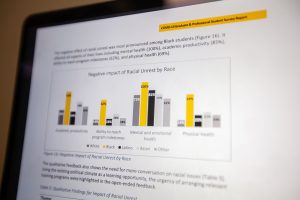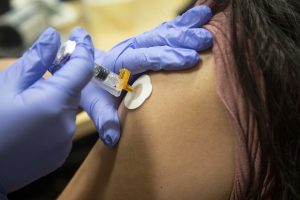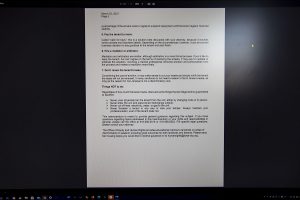USG constituency senatorial candidates pursue seats to represent first generation, LGBTQ+, and veteran students
Although uncontested, three candidates seeking positions as USG constituency senators share the same drive to represent and advocate for historically marginalized groups on campus.
(left to right) Candidates for USG Constituency Senator positions Nick Nachtman, Xiangheng Li, and Sam Andrus pose for portraits on Wednesday, March 31.
April 1, 2021
With the Undergraduate Student Government election season underway, three candidates anticipate gaining a seat in the senate as constituency senators.
Representing their university constituents is Xiangheng Li for the first-generation seat, Nick Nachtman for the LGBTQ+ seat, and Sam Andrus for the veteran seat.
USG Constituency seats make up nine potential USG senatorial positions for constituents: Asian Pacific Islander Desi American, Black, disability, international student, LGBTQ+, Latinx, Native American, and veteran undergraduate populations.
Although the three candidates will acquire positions in USG as constituency senators, USG has yet to fill constituency positions representing Asian Pacific Islander Desi American, Black, international student, Latinx, Disability, and Native American, undergraduate populations.
As a member of an underrepresented group on campus, constituency senators aim to address these groups’ needs and unique challenges.
USG Elections Commissioner Andy Swiston said it’s typical for constituency senator seats to go unfilled during some election cycles.
“Especially in the last few years, we’ve had low turnout in general, so it’s no surprise to me that the number of constituency senators is low too,” Swiston said. “That said, the positions are generally not as well advertised, require more work to advocate for a specific constituency, and have fewer people to draw from to fill each position.”
The election procedure varies depending on the constituency position, Swiston added.
“[Six constituencies] are elected via similar rules to the rest of the candidates, so it’s possible that there could be multiple candidates running for those seats,” he said. “[Three] constituencies are directly appointed by student organizations, and while there may be multiple people within an organization that want a spot, from the USG’s end, there’s only one pick.”
The three organization-appointed positions are the veteran, Native American, and international student constituencies.
Although over half of the constituency seats remain empty, USG’s new first-generation senatorial position will be filled, as this is the position’s first existing year.
Li said he looks forward to being USG’s first representative for this constituency, setting his hopes on opening up the dialogue among first-generation students.
“One of the things that I really look forward to is establishing a relationship with the freshmen students here,” Li said. “A lot of these [first-generation] students fear that they’ll feel disconnected because of their backgrounds, so that’s one of the first things I’ll really be emphasizing when I take over the position next year.”
Li said he felt compelled to run for the constituency senator seat because he understands the challenge of navigating college without the guidance of a parent who experienced college.
“I was kind of like a trailblazer in my family because I had to learn how to navigate a lot of different areas in college. You know, finding out how to fill out the FAFSA and learning about the college application process myself,” Li said. “There’s a lot of things that first-generation students typically have to learn by themselves, compared to other students who have parents in the family that helped them with those kinds of processes.”
Nachtman said he has two weeks of experience as USG’s LGBTQ+ constituency senator under his belt and is running in this year’s election to serve a full term in the position.
Concerned by the LGBTQ+ community’s limited social interaction throughout the pandemic, Nachtman said his primary focus as constituency senator would be spreading awareness about the university’s already-existing LGBTQ+ resources.
“The thing about queer people is that we’re a group where community is especially important because during our developing years, we’re not surrounded by people who always look like us, or we know are like us,” Nachtman said. “And so, as we begin opening up again, my big goal is ensuring that all LGBTQ+ students know about all the resources that exist on campus.”
While Nachtman plans on providing all LGBTQ+ students with the information they need to access important resources, he said he hopes to kick-start a mentorship program for the university’s LGBTQ+ community.
“Next year, I want to create a mentorship program that connects LGBTQ+ mentors, whether it’s adults or older students, to younger and new students entering campus,” he said. “LGBTQ+ students can then have a person to turn to who knows what’s going on. They can talk to them about these big changes that are happening in their lives and would have someone to turn to about this huge part of themselves.”
After serving six years of active duty in the Air Force and currently holding the position as vice president of the UI Veteran’s Association, Andrus said he wants to further extend his reach to undergraduate veterans by filling USG’s veteran constituency seat.
“One thing that I really do believe in is trying to break the stigma of what being a veteran is, especially when in college,” Andrus said. “Some people will look at veterans as rough and tumble…and that’s not the case. We’re here to get an education, we’re here to learn. We can add value to almost every situation we go in.”
Andrus said he plans to continue working with Student Disabilities Services and University of Iowa Counseling Services to guarantee veteran students with disabilities have access to the resources they need for a successful college experience.
“I think that from a veteran standpoint, we do a very good job at not only knowing our resources but being able to disseminate that information downwards to the people who can use it,” Andrus added. “I think that as a constituency senator, I could be able to help build those ties a little bit better with the UI Veteran Association or with university counseling services and act as a voice and liaison between them.”
Editor’s note: this article has been updated to reflect that there are three student constituency positions appointed by organizations rather than in at-large elections, not two, as a source mistakenly said.






